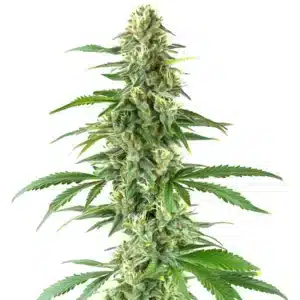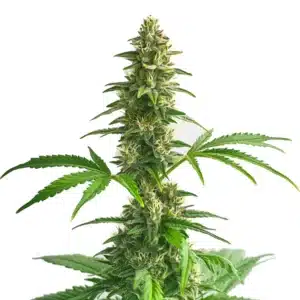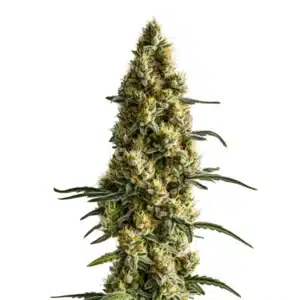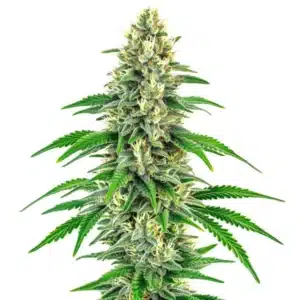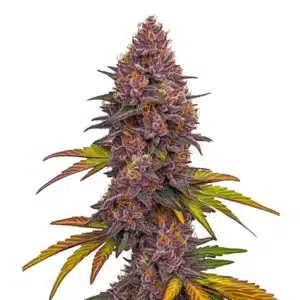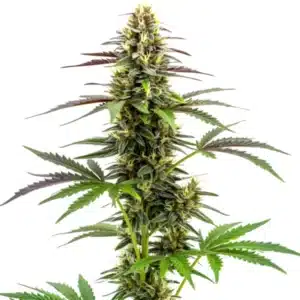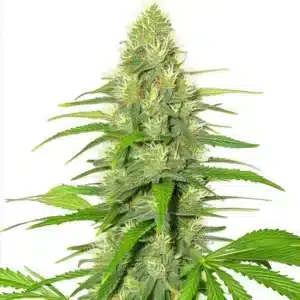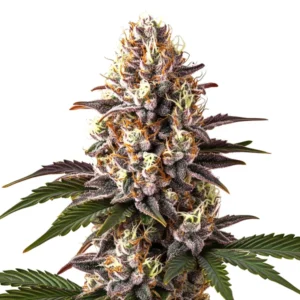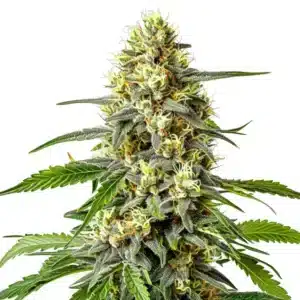
Can CBD Be Converted Into THC With Enzymes?
Curiosity often leads us to ask: can CBD be converted into THC with enzymes? This intriguing question draws us into the world of cannabis chemistry. For those new to cannabis or seasoned growers, it’s a topic that combines science with real-world applications. Knowing how natural compounds interact can revolutionize how we view cannabis cultivation and consumption.
CBD and THC are the two most well-known cannabinoids found in cannabis plants. They each offer unique effects and benefits. While CBD is non-psychoactive, THC is famous for its mind-altering properties. The idea of converting one into the other using enzymes isn’t just fascinating—it’s a potential game-changer for both growers and consumers.
Recommended Strains
Yumboldt
|
|
THC | 18% - 20% (Medium) |
|
|
Type | Feminized |
|
|
Yield | Medium |
|
|
Phenotype | 70% Indica / 30% Sativa |
Yumbolt Auto
|
|
THC | 12% - 24% (Medium) |
|
|
Type | Autoflowering |
|
|
Yield | Medium |
|
|
Phenotype | 80% Indica / 20% Sativa |
Enzymes are proteins acting as catalysts in biochemical reactions. They speed up processes that would otherwise be too slow to observe. When it comes to the enzymatic transformation of CBD into THC, researchers are investigating how specific enzymes can facilitate this conversion. If successful, it could open new avenues for creating cannabis products with tailored cannabinoid profiles.
The Science Behind CBD to THC Enzyme Conversion Process
The CBD to THC enzyme conversion process is rooted in the molecular structure of cannabinoids. Both CBD and THC share a similar chemical blueprint, with slight differences influencing their effects. Enzymes can manipulate these structures, selectively breaking down and rebuilding molecules to alter their form.
Biochemical conversion of CBD to THC involves precise conditions. Temperature, pH levels, and the presence of specific enzymes all play critical roles. Researchers are experimenting in labs, trying to harness this process safely and effectively. However, it’s not just a matter of mixing ingredients; meticulous control is required to achieve the desired transformation.
Knowing the molecular intricacies involved in the CBD to THC enzyme conversion process is crucial for advancing this technology. Scientists are meticulously studying the reaction pathways and identifying key enzymes that can catalyze the conversion efficiently. By mapping out these pathways, they aim to refine the process, ensuring that it can be applied consistently and effectively in commercial settings.
Moreover, the implications of this biochemical conversion extend beyond just altering cannabinoid profiles. It provides insights into the dynamic nature of plant biochemistry and opens doors to exploring similar conversions in other botanicals. As we delve deeper into the science, the potential applications of enzyme technology in agriculture and pharmacology become increasingly apparent.
Promos & Deals
Enzymatic Transformation of CBD into THC
Enzymes turning CBD into THC is a concept under active exploration. By focusing on the enzymatic transformation of CBD into THC, scientists hope to unlock new potential in cannabis production. This method could allow growers to produce strains with specific cannabinoid ratios, offering customized effects for consumers.
Consider cannabis strains like White Widow from Blimburn Seeds. Known for its balanced effects, imagine enhancing its THC content through enzymatic conversion. Such innovation could lead to products that meet diverse consumer needs, from relaxation to invigorating experiences.
The enzymatic transformation of CBD into THC not only holds promise for enhancing existing strains but also for creating entirely new ones. By manipulating the cannabinoid content, researchers can develop unique profiles that cater to specific health benefits or recreational preferences. This could revolutionize the way we approach breeding and selection within the cannabis industry.
Furthermore, the potential for enzymatic transformation extends beyond just THC enhancement. It offers a platform for exploring other cannabinoid transformations, potentially leading to the discovery of novel compounds with therapeutic benefits. The ability to precisely control cannabinoid synthesis through enzymes is poised to become a cornerstone of future cannabis innovation.

Practical Applications in Cannabis Cultivation
The prospect of CBD conversion to THC using enzymes holds promise for cannabis cultivation. Growers could optimize their crops, creating plants with higher THC levels without traditional breeding methods. This approach could save time and resources, focusing on quality rather than quantity.
For instance, a strain like Blue Dream might be modified to enhance its therapeutic properties. By adjusting the CBD and THC balance, growers could cater to medical users seeking specific relief, as well as recreational users chasing a particular high.
The integration of enzymatic technology into cannabis cultivation also supports sustainable practices. By minimizing the need for extensive cross-breeding and reducing the time required to develop new strains, the industry can lower its environmental impact. This aligns with the growing demand for eco-friendly agricultural practices across the globe.
Additionally, the ability to fine-tune cannabinoid profiles through enzymes could support niche markets within the cannabis industry. Producers could offer specialized products tailored to specific consumer demographics, such as athletes seeking recovery aids or individuals looking for non-psychoactive therapies. This level of customization is a significant advancement in meeting diverse consumer needs.
Challenges and Considerations
While the enzymatic transformation of CBD into THC is promising, it’s not without challenges. The precision required in the conversion process means that even minor deviations can lead to unwanted results. Growers and researchers must work closely to ensure safety and efficacy.
The regulatory landscape is another hurdle. As the cannabis industry evolves, laws and guidelines regarding cannabinoid manipulation are still catching up. Producers must navigate these complexities to ensure compliance while innovating in their cultivation practices.
One of the primary challenges lies in scaling the CBD conversion to THC using enzymes for commercial production. Laboratory success does not always translate seamlessly to large-scale operations. Ensuring that the process remains consistent and cost-effective on a broader scale is essential for its adoption within the industry.
Moreover, public perception and acceptance remain pivotal. Transparency in the process and rigorous testing for safety and efficacy are necessary to gain consumer trust. Education campaigns highlighting the benefits and safety of enzymes turning CBD into THC will be vital in overcoming potential skepticism and resistance.

FAQs
Can enzymes naturally convert CBD to THC in cannabis plants?
In nature, enzymes within the cannabis plant are responsible for converting precursor compounds into cannabinoids like CBD and THC. However, the natural conversion of CBD to THC is not typical within the plant itself. This transformation usually requires external intervention to alter the molecular structure of CBD into THC.
While enzymes are important in the plant’s natural processes, the specific conversion of CBD to THC using enzymes outside of a laboratory setting is still a developing area of study. Researchers are exploring ways to harness this potential through controlled conditions and specific enzymatic reactions.
The question “can CBD be converted into THC with enzymes” naturally arises as scientists seek to replicate or enhance natural processes. Knowing how to facilitate this biochemical conversion of CBD to THC outside the plant could lead to groundbreaking developments in cannabinoid research and application.
Ongoing studies aim to identify more efficient enzymatic pathways and optimize reaction conditions. The hope is that, with continued research, natural and safe methods for CBD to THC enzyme conversion can be discovered and leveraged in practical applications.
Are there any legal implications for converting CBD into THC?
The legal implications of converting CBD into THC vary by jurisdiction. In many places, THC is a controlled substance, while CBD is more widely accepted. Engaging in the biochemical conversion of CBD to THC could bring legal challenges, especially if it leads to products that exceed legal THC limits.
Growers and producers must stay informed about local laws and regulations concerning cannabinoids. Compliance with legal standards is essential to avoid potential penalties and ensure the safe distribution of cannabis products.
The complex legal landscape surrounding cannabinoids makes it crucial for stakeholders to remain vigilant. As laws continue to evolve, being proactive in knowing and adapting to regulatory changes is paramount for anyone involved in CBD conversion to THC using enzymes.
Additionally, international trade considerations must not be overlooked. Varying regulations across borders could impact the distribution and marketing of products derived from enzymatic conversion, necessitating careful planning and compliance strategies.
What are the benefits of CBD conversion to THC using enzymes?
The ability to convert CBD to THC using enzymes offers several benefits. It allows for the creation of customized cannabis products with specific cannabinoid profiles. This means consumers can enjoy tailored effects, enhancing their experience whether for recreational or medicinal purposes.
Moreover, enzymatic conversion can streamline the production process. Instead of relying solely on selective breeding to achieve desired THC levels, growers can use enzyme technology to efficiently modify cannabinoid content, saving time and resources while maintaining quality.
This technological advancement could democratize access to high-quality cannabis. By reducing production costs and time, more growers could enter the market, increasing competition and potentially lowering prices for consumers. This accessibility could transform how cannabis is perceived and utilized globally.
Furthermore, the precision offered by enzymatic transformation of CBD into THC can lead to more consistent product offerings. Consumers could rely on predictable effects and quality, enhancing their overall experience and trust in cannabis products tailored to their specific needs.
Is it possible to control the THC levels in cannabis strains through enzymatic conversion?
Yes, enzymatic conversion allows for control over THC levels in cannabis strains. By manipulating the enzymatic reactions, growers can adjust the cannabinoid balance in their plants. This offers the potential to produce strains with high THC concentrations or balanced CBD to THC ratios, depending on consumer demand.
For example, a strain like Critical Mass could be optimized for higher THC levels using this technique. Such control over cannabinoid content can cater to diverse user preferences, enhancing the cannabis experience for different needs and occasions.
The ability to precisely control THC levels through enzymatic conversion is a significant development for both medicinal and recreational markets. It allows for the tailoring of cannabis products to meet specific therapeutic requirements or recreational desires, potentially improving user satisfaction and outcomes.
Moreover, this control extends to the consistency of end products. By utilizing CBD to THC enzyme conversion process, producers can ensure that each batch meets stringent quality and potency standards, reducing variability and enhancing consumer confidence in the products they purchase.
Are there any risks associated with enzymes turning CBD into THC?
While the concept is promising, there are risks involved with enzymes turning CBD into THC. The precision required in the conversion process means that mistakes can lead to unintended outcomes. Careful monitoring and control are essential to avoid producing unsafe or ineffective products.
Additionally, the regulatory environment poses challenges. As laws and guidelines around cannabis evolve, producers must ensure compliance while exploring enzymatic conversion. Balancing innovation with safety and legality is crucial to successfully leveraging this technology in the cannabis industry.
Ensuring the safety and efficacy of products derived from CBD conversion to THC using enzymes is a top priority. Rigorous testing and quality control measures must be in place to prevent potential health risks associated with improperly converted cannabinoids.
Furthermore, the complexity of the biochemical conversion process necessitates skilled personnel and advanced technologies. Investment in training and infrastructure is essential to mitigate risks and harness the full potential of enzymatic transformation within the cannabis sector.


